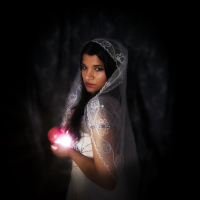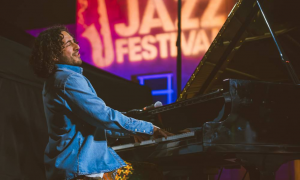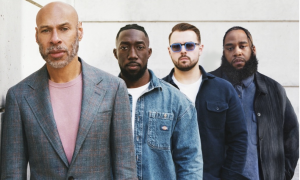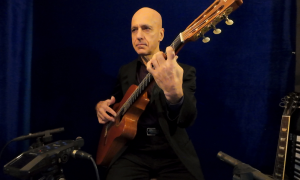Tom DiCillo's “When You're Strange: A Film About The Doors" means to answer the more loony flights of fancy taken by Oliver Stone in his 1991 Doors biopic, but, in the process, creates a formal exercise in redundancy, offering no new insights into the much mythologized rock band.
The documentary does boast unseen archival footage of Doors band members Jim Morrison, Robbie Krieger, Ray Manzarek and John Densmore rehearsing, performing, hanging out backstage and, in the case of singer Morrison, defining, for better and worse, the rock-star template that some musicians still follow to this day.
Die-hard fans will also revel in seeing several scenes from “HWY," an experimental film Morrison made with friends in 1969 out in the Southern California desert. We watch The Lizard King driving and crashing a '66 Mustang fastback, covering a dying coyote with a blanket and lending his camera-ready charisma to the role of aimless drifter.
That home movie footage is more revelatory than anything else in DiCillo's film, which rehashes the band's well-chronicled, boom-to-bust history in rote fashion.
DiCillo ("Living in Oblivion") inserts the same '60s news clips that we've seen a million times -- JFK, MLK and RFK shot, Vietnam, civil-rights marches -- to let us know that, yes, the decade was tumultuous. DiCillo constantly fudges with the timeline, though, in a pointless effort to have The Doors' music directly comment on the major news events.
Instead of “The Wonder Years" montages, the movie would have benefited enormously from new interviews with the surviving band members. Perhaps legal entanglements prevented that from happening. Densmore has successfully sued Krieger and Manzarek over the years for using the band's name and logo in new incarnations.
Undoubtedly, the trio would have had some interesting (and conflicting) things to say about The Doors' legacy, but their thoughts might not have jibed with the kind of reductive myth-making that DiCillo seeks with his movie.
Johnny Depp provides the narration, dutifully reading the bland script and trying to lend a measure of soulfulness to the textbook-quality words.
The documentary does boast unseen archival footage of Doors band members Jim Morrison, Robbie Krieger, Ray Manzarek and John Densmore rehearsing, performing, hanging out backstage and, in the case of singer Morrison, defining, for better and worse, the rock-star template that some musicians still follow to this day.
Die-hard fans will also revel in seeing several scenes from “HWY," an experimental film Morrison made with friends in 1969 out in the Southern California desert. We watch The Lizard King driving and crashing a '66 Mustang fastback, covering a dying coyote with a blanket and lending his camera-ready charisma to the role of aimless drifter.
That home movie footage is more revelatory than anything else in DiCillo's film, which rehashes the band's well-chronicled, boom-to-bust history in rote fashion.
DiCillo ("Living in Oblivion") inserts the same '60s news clips that we've seen a million times -- JFK, MLK and RFK shot, Vietnam, civil-rights marches -- to let us know that, yes, the decade was tumultuous. DiCillo constantly fudges with the timeline, though, in a pointless effort to have The Doors' music directly comment on the major news events.
Instead of “The Wonder Years" montages, the movie would have benefited enormously from new interviews with the surviving band members. Perhaps legal entanglements prevented that from happening. Densmore has successfully sued Krieger and Manzarek over the years for using the band's name and logo in new incarnations.
Undoubtedly, the trio would have had some interesting (and conflicting) things to say about The Doors' legacy, but their thoughts might not have jibed with the kind of reductive myth-making that DiCillo seeks with his movie.
Johnny Depp provides the narration, dutifully reading the bland script and trying to lend a measure of soulfulness to the textbook-quality words.
For more information contact All About Jazz.





















